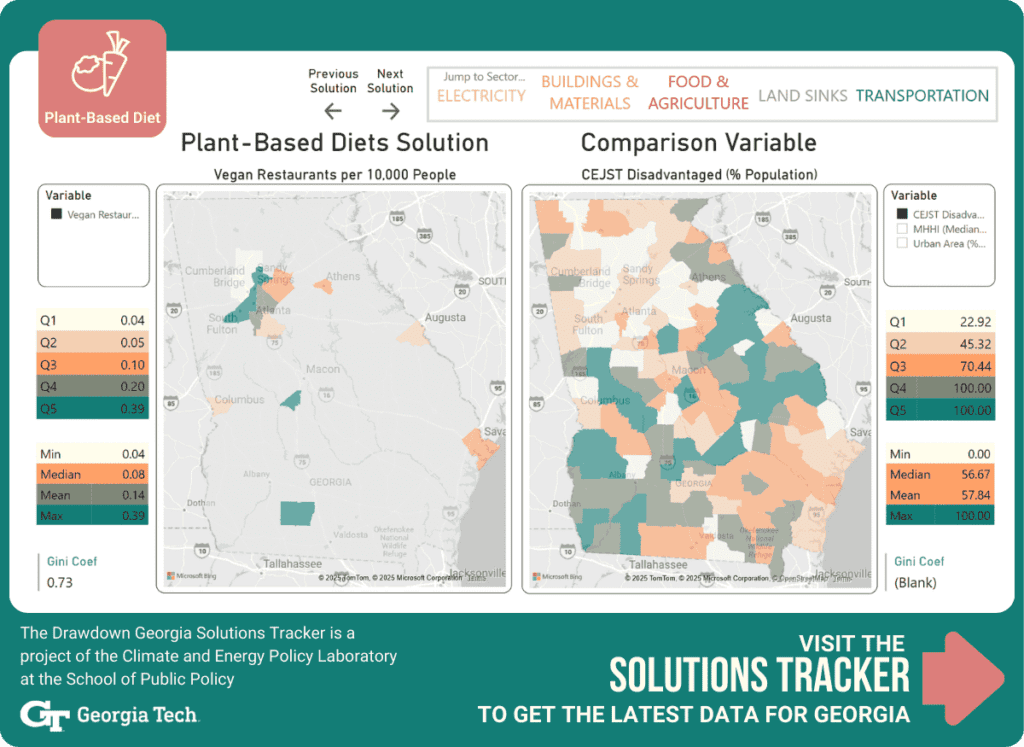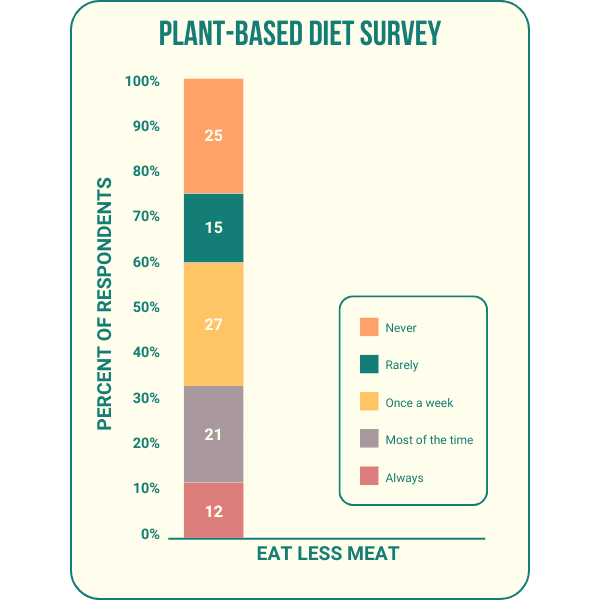The Benefits of a Plant-Based Diet
A plant-based diet, such as a vegetarian or vegan diet, can reduce emissions associated with meat production. This solution also includes benefits for reducing meat intake in a non-vegetarian or non-vegan lifestyle. This solution assumes people 1) maintain a 2,500 calorie per day nutritional regimen; 2) meet daily protein requirements; and 3) purchase locally produced food when available.
Access Plant-Based Diet Resources from Drawdown Georgia
Market Readiness And Available Technology
Meat-rich diets are one of the major sources of greenhouse gas emissions in the United States. An alternative to meat, plant-rich diets have significant potential to reduce greenhouse gas emissions.
According to a 2022 article in Scientific American, simply removing beef from the typical American diet can lower the carbon footprint of our food by almost 25%. The technology is becoming mature with brands such as “Beyond Meat” and “Impossible Foods”, but the market readiness depends on the shift of consumer choices and affordability.
Other market and technology updates relevant to plant-based diets:
- The National Academies of Sciences, Engineering, and Medicine convened a workshop in 2019 to review and discuss Sustainable Diets, Food, and Nutrition for Americans.
- Reservation platforms like Resy and search engines like Google include the option to filter your restaurant search by vegan options to make it easier to identify and find vegan restaurants.
- The Georgia Department of Agriculture provides a list of community farmers' markets happening across the state, making it easier for individuals and restaurants to access local produce.
Plant-Based Diets as a Climate Solution in Georgia
The Drawdown Georgia research team estimates that Georgia could reduce emissions by one megaton (Mt) of CO2e if 25% of Georgians adopt a plant-based or lower-carbon-emitting diet.
What is the Carbon Emissions Reduction Potential by 2030?
Achievable reduction potential is derived by taking the technical reduction potential, outlined below, and developing a more realistic forecast that takes current rates of deployment, market constraints, and other barriers into consideration.
For plant-based diets, the Drawdown Georgia research team has calculated the achievable reduction potential to be 0.38 Mt of CO2e.
What Is the Upper Limit of Carbon Emissions Reduction Potential?
Technical reduction potential reflects the upper limit of emissions reductions for this solution without regards to the constraints that exist in the real world, such as economic or political considerations.
For plant-based diets, the Drawdown Georgia research team has calculated the technical reduction potential to be 3.44 Mt.
Progress on Plant-Based Diets in Georgia
A good number of companies in the United States are promoting plant-rich diets and grass-fed meats that produce less carbon emissions. The availability of environmental impact data for the production of animal-based proteins varies widely based on production practices.
Vegan restaurants remain concentrated in urban areas, with Atlanta, Warner Robins (near Macon), and Albany having a noticeably higher prevalence than other cities. Atlanta-based Slutty Vegan is one of the country's fastest growing vegan chains with multiple locations in Georgia.

Challenges in Scaling Plant-Based Diets
A Georgia Tech/UGA survey of nearly 1,700 state residents (funded by Drawdown Georgia) found that while 12% of respondents "always" limit their meat intake and 21% do so "most of the time," a significant 25% never make this change.

The survey results suggest that dietary habits, cultural preferences, and lack of accessible plant-based alternatives might play a role in preventing widespread adoption.
Another University of Georgia survey of over 450 state residents, also funded by Drawdown Georgia, provides insight into the challenges of orienting the diets of Georgians more toward plant-based meals. Only about 3% of respondents said they do not consume meat or fish products, and 16% said they only consume meat and fish occasionally.
More than a third (35%), on the other hand, consume meat or fish at every meal, with the remaining 45% eating it once or twice per day. When asked, 70% said they would like to continue eating the same amount of meat and fish as they currently do, and an additional 21% said they would like to increase their meat and fish consumption. Only 6% of respondents said they would rather eat less of it.
Importantly, about a third of respondents said it would be relatively easy to cut back their meat and fish consumption by 25%, another third said it would be relatively difficult, and the remaining third thought it would be neither difficult nor easy to do so.
Overall, it appears Georgians do not generally want to reduce their meat and fish consumption, but doing so would not be particularly burdensome to many households.
How Reliable Is Our Estimate For This Drawdown Georgia Climate Solution?
The solution has significant potential to reduce CO2 emissions by displacing meat with a plant-based diet or low-carbon meats. According to the USDA-ERS, the per capita displacement of meat was about 100 kg of red meat and poultry in 2018.
According to Life Cycle Analysis (LCA) data from Heller et al. (2013), the average greenhouse gas emissions rate is 12.05 kg of CO2 per kg of meat. If 10% of the Georgia population shifts to a plant-based diet, the shift would reduce about 1.4 Mt CO2-e per year.
Cost Competitiveness
It depends on the consumer choices, accessibility, availability, and preferences.
Beyond Carbon Attributes
This solution results in improved water quality and less extensive farming practices. The farming efficiency of plant-based foods increases with the concentration of higher proteins, while higher animal protein foods decrease the efficiency of energy inputs.
Health benefits associated with a plant-rich diet include a reduction in obesity and a reduced risk of developing diabetes. Statistically significant protection from cancer is also associated with switching to a non-animal-based diet. A recent study published in the American Journal of Clinical Nutrition found that the Planetary Health Diet can lower the risk of premature death by 30% and can substantially decrease the average person’s environmental impact.
Plant-rich diets are less expensive primarily because healthy eating can reduce healthcare costs by lowering the potential for chronic diseases. An example from New Zealand found healthcare savings to be from $14-$20 billion over the lifetime of their population.
There could also be adverse financial impacts for producers of meat-based products and loss of money on livestock. The biggest challenge for scaling this solution is overcoming opposition to a non-meat diet; smaller steps towards the new diet will be more effective in achieving success.



